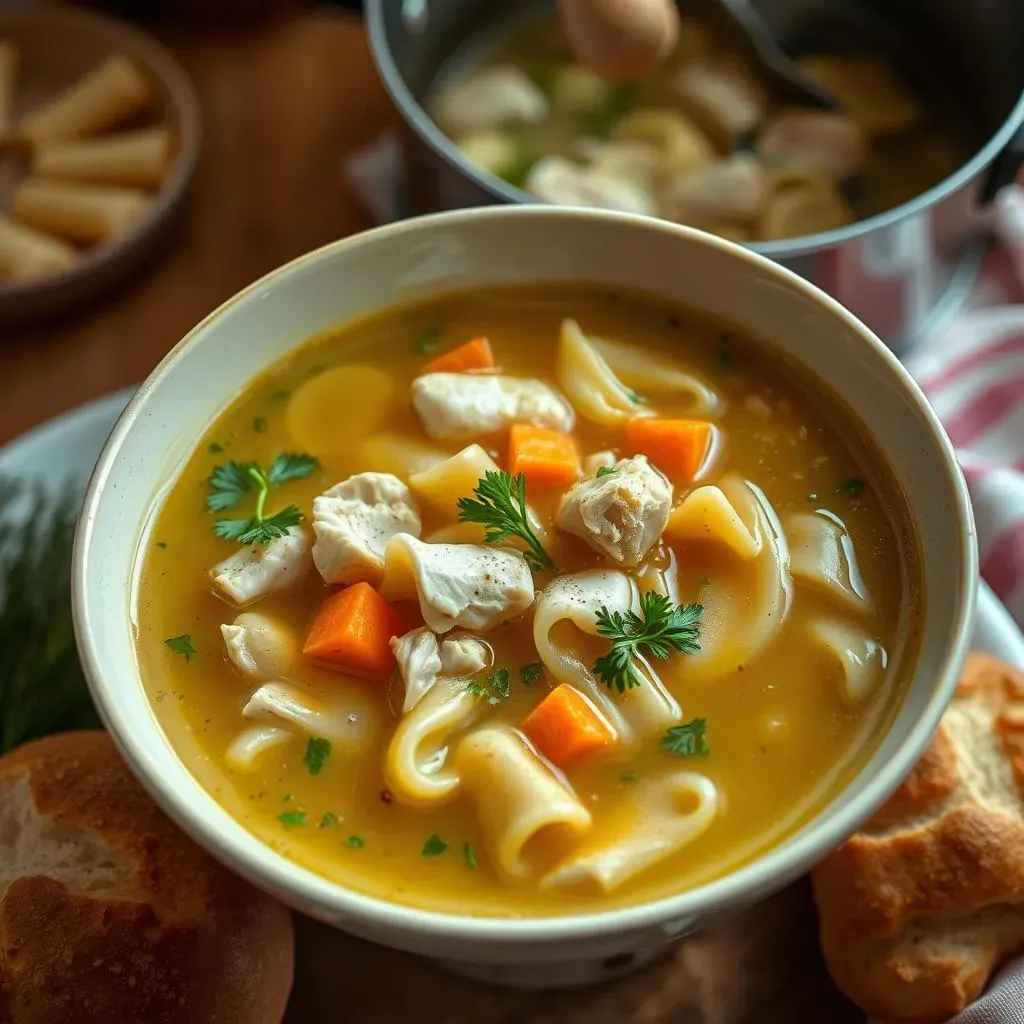Table of Contents
Is there anything more comforting than a steaming bowl of chicken noodle soup? For many, especially within the Jewish community, it's more than just a meal; it's a tradition, a cure-all, and a taste of home. A good chicken noodle soup recipe jewish isn't just about throwing ingredients into a pot; it's about creating something nourishing, flavorful, and deeply satisfying. Think of it as liquid gold, passed down through generations. This article dives into the heart of what makes Jewish chicken noodle soup so special. We'll explore the key ingredients that give it its unique character, walk you through a simple, step-by-step recipe, and even offer some creative twists to make it your own. Whether you're looking to recreate a beloved family recipe or discover a new favorite, get ready to master the art of Jewish chicken noodle soup. From selecting the right chicken to perfecting those melt-in-your-mouth noodles, we'll cover everything you need to know to create a truly unforgettable bowl. So, grab your apron, and let's get cooking!
What Makes Jewish Chicken Noodle Soup Special?
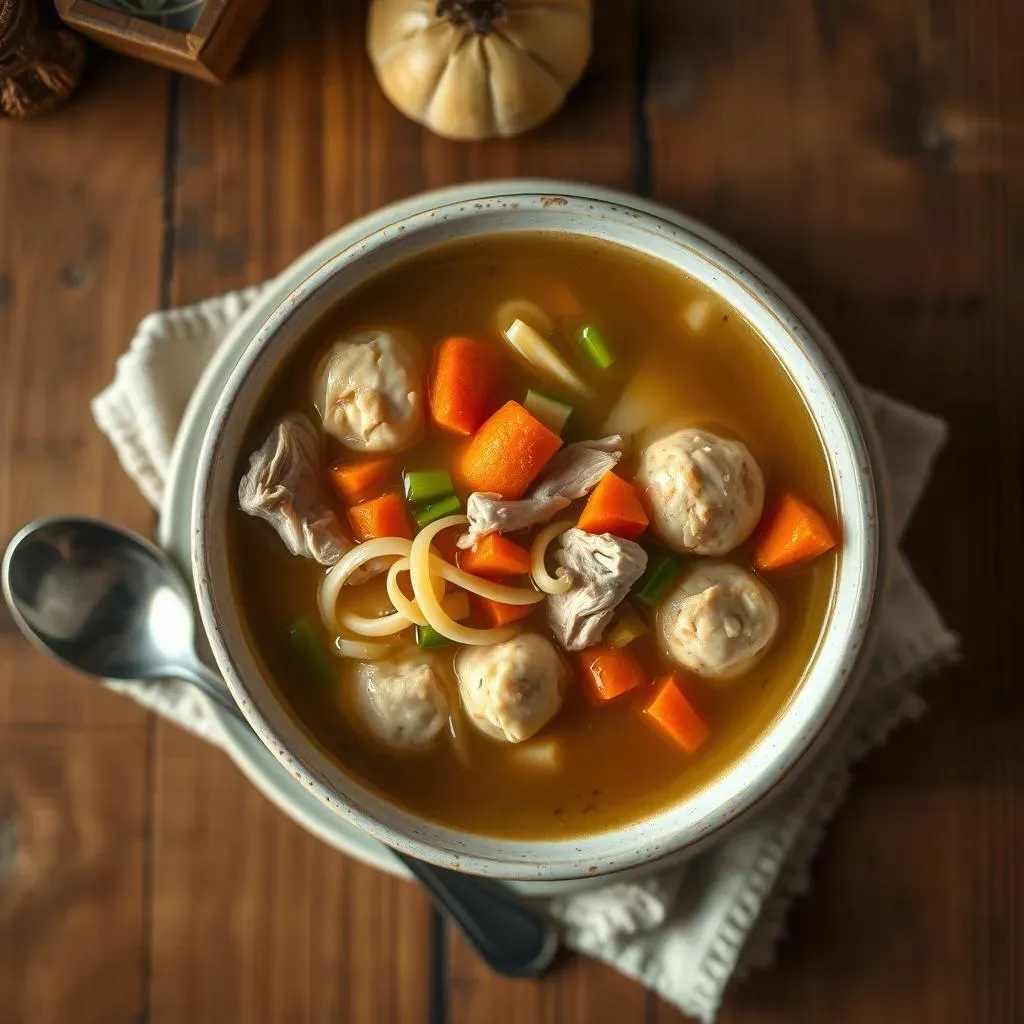
What Makes Jewish Chicken Noodle Soup Special?
More Than Just Soup: A Cultural Staple
Jewish chicken noodle soup, often lovingly referred to as "Jewish penicillin," transcends the boundaries of a simple cold remedy. It's deeply embedded in Jewish culture, a symbol of comfort, healing, and family tradition. Think about it: from childhood sniffles to holiday gatherings, this soup is a constant presence, a culinary hug that warms both body and soul. It's not just about the ingredients; it's about the love and care poured into each batch, passed down through generations.
The Healing Power: Real and Perceived
While it might not be actual penicillin, there's a reason why Jewish chicken noodle soup has earned its nickname. The combination of warm broth, nourishing chicken, and nutrient-rich vegetables provides essential hydration and electrolytes, helping to combat dehydration and fatigue. Studies have even suggested that chicken soup can help reduce inflammation and clear nasal congestion. But beyond the scientific benefits, there's the undeniable psychological comfort it provides. That familiar aroma, the soothing warmth, the knowledge that someone cared enough to make it – these all contribute to a sense of well-being that can aid in recovery.
The Secret's in the Simmer: A Labor of Love
Unlike a quick weeknight dinner, authentic Jewish chicken noodle soup is a labor of love, often simmered for hours to extract maximum flavor and nutrients from the ingredients. This slow cooking process allows the chicken to become incredibly tender, the vegetables to meld together harmoniously, and the broth to develop a rich, golden hue. It's a commitment of time and effort, a testament to the importance of nurturing and caring for loved ones. This dedication is what truly sets it apart, transforming a simple soup into something truly special.
Key Element | Description | Why It Matters |
|---|---|---|
Long Simmer Time | Soup simmers for several hours | Extracts maximum flavor and nutrients |
Homemade Broth | Broth made from scratch with chicken and vegetables | Provides a richer, more complex flavor |
Love and Care | Prepared with attention and affection | Adds a psychological element of comfort and healing |
Gathering Your Ingredients for Authentic Jewish Chicken Noodle Soup
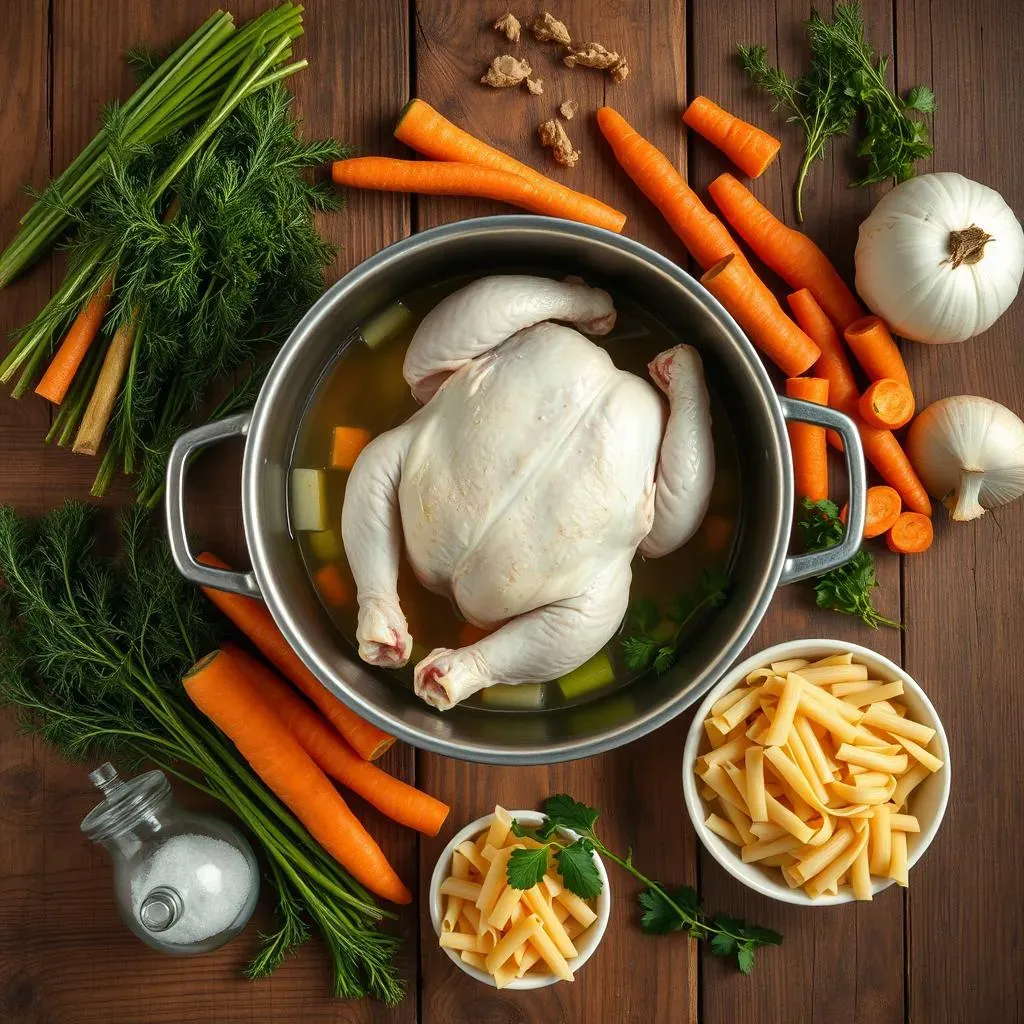
Gathering Your Ingredients for Authentic Jewish Chicken Noodle Soup
The Foundation: Choosing Your Chicken
The quality of your chicken is paramount. I always aim for a whole chicken, about 3-4 pounds. Why whole? Because the bones contribute so much flavor to the broth! You can absolutely use bone-in, skin-on chicken pieces like thighs and drumsticks if you prefer, but a whole chicken provides the most depth. Don't skimp on quality here; opt for organic or free-range if your budget allows. The difference in flavor is noticeable. And remember to remove the giblets – you can save them for another use or discard them.
Also, consider the fat content. A bit of fat is essential for a rich broth, but too much can make the soup greasy. I usually trim off any excess fat before simmering. Trust me, a little effort here goes a long way.
The Flavor Brigade: Vegetables and Aromatics
Now, for the veggies! This is where you can really customize your soup to your liking, but there are a few essentials. Carrots, celery, and onions form the holy trinity of aromatic vegetables, providing sweetness, depth, and that classic chicken soup flavor. I typically use about 2-3 carrots, 2-3 celery stalks, and one large onion, all roughly chopped. Don't be afraid to add other vegetables like parsnips, turnips, or even a bit of leek for extra complexity. Fresh herbs are also crucial. Dill and parsley are my go-to choices, adding a bright, fresh note that balances the richness of the broth. A few sprigs of thyme or a bay leaf can also add a subtle layer of flavor.
One trick that I've learned is to lightly sauté the onions and carrots before adding them to the pot, it helps to sweeten the soup.
Noodles and Seasoning: The Finishing Touches
almost there! Noodles are, of course, a must. Egg noodles are the traditional choice for Jewish chicken noodle soup, providing a comforting, chewy texture. You can use wide or narrow noodles, depending on your preference. Just be careful not to overcook them, or they'll turn mushy. Add them to the soup during the last 15-20 minutes of cooking, until they're tender but still have a bit of bite. If you are gluten-free, there are many gluten free noodles to choose from.
Finally, seasoning is key. Salt and pepper are essential, of course, but don't be afraid to experiment with other flavors. A pinch of garlic powder or onion powder can add depth, while a dash of turmeric can enhance the color and provide anti-inflammatory benefits. Taste as you go, and adjust the seasoning to your liking. Remember, the goal is to create a soup that is both nourishing and delicious, a true testament to the power of home cooking.
Ingredient | Quantity | Notes |
|---|---|---|
Whole Chicken | 3-4 lbs | Organic or free-range preferred |
Carrots | 2-3 | Roughly chopped |
Celery | 2-3 stalks | Roughly chopped |
Onion | 1 large | Roughly chopped |
Egg Noodles | 8 oz | Add during the last 15-20 minutes of cooking |
Fresh Dill & Parsley | Small bunch | Chopped |
Salt & Pepper | To taste | Adjust to your liking |
StepbyStep: Cooking the Perfect Jewish Chicken Noodle Soup
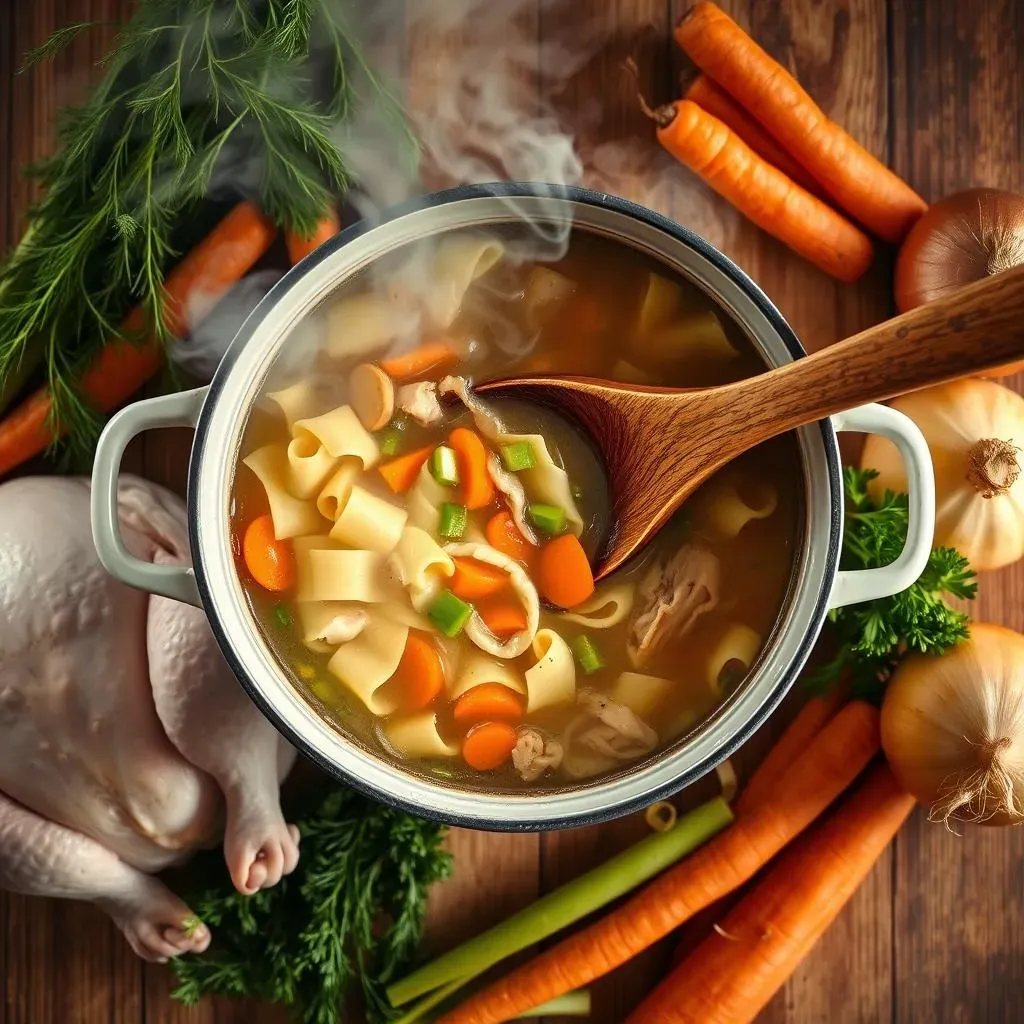
StepbyStep: Cooking the Perfect Jewish Chicken Noodle Soup
Step 1: Building the Broth
Alright, let's get this broth going! This is where the magic happens. First, give your whole chicken a good rinse under cold water. Place it in a large stockpot (at least 8 quarts) and cover it with cold water – you want the water level to be a few inches above the chicken. Bring it to a boil over high heat, and then immediately reduce the heat to a gentle simmer. Skim off any foam or impurities that rise to the surface – this will ensure a clear, flavorful broth. Now, add your chopped carrots, celery, and onion. Toss in a few sprigs of fresh dill and parsley, and season generously with salt and pepper. Let it simmer, partially covered, for at least 2-3 hours, or even longer if you have the time. The longer it simmers, the richer and more flavorful the broth will be.
Remember, patience is key! Don't rush this process. Let the flavors meld together slowly and create a truly exceptional broth. I usually check on it every hour or so, skimming off any additional foam and adding more water if needed to keep the chicken submerged.
Step 2: Shredding the Chicken and Straining the Broth
Once your broth has simmered to perfection, it's time to remove the chicken. Carefully transfer it to a large bowl and let it cool slightly. While the chicken is cooling, strain the broth through a fine-mesh sieve lined with cheesecloth. This will remove all the solids, leaving you with a clear, golden liquid. Discard the cooked vegetables and herbs – they've done their job! Now, shred the chicken, discarding the skin and bones. You can shred it finely or leave it in larger chunks, depending on your preference. Set the shredded chicken aside.
Don't throw away the chicken carcass! You can use it to make another batch of broth. Simply freeze it and add it to a pot with fresh vegetables and herbs for a second simmer. You'll be surprised at how much flavor you can extract from it.
Step 3: Combining, Cooking Noodles, and Serving
Now, it's time to bring it all together! Return the strained broth to the stockpot and bring it to a boil. Add your egg noodles and cook according to package directions, usually about 7-10 minutes, or until they're tender but still have a bit of bite. Once the noodles are cooked, add the shredded chicken back to the pot and heat through. Taste and adjust the seasoning as needed. Garnish with fresh dill and parsley before serving. And that's it – you've made a pot of delicious, comforting Jewish chicken noodle soup!
Serve it hot with a side of crusty bread or matzo crackers. And don't forget to share it with loved ones – this soup is best enjoyed with family and friends.
Step | Description | Tips |
|---|---|---|
Simmer Broth | Simmer chicken, vegetables, and herbs for 2-3 hours | Skim off foam for a clear broth |
Strain Broth | Strain broth through a fine-mesh sieve | Discard cooked vegetables and herbs |
Shred Chicken | Shred chicken, discarding skin and bones | Shred finely or leave in larger chunks |
Cook Noodles | Add egg noodles to broth and cook until tender | Don't overcook the noodles |
Combine and Serve | Add shredded chicken back to the pot and heat through | Garnish with fresh dill and parsley |
Variations and Addins for Your Chicken Noodle Soup Recipe
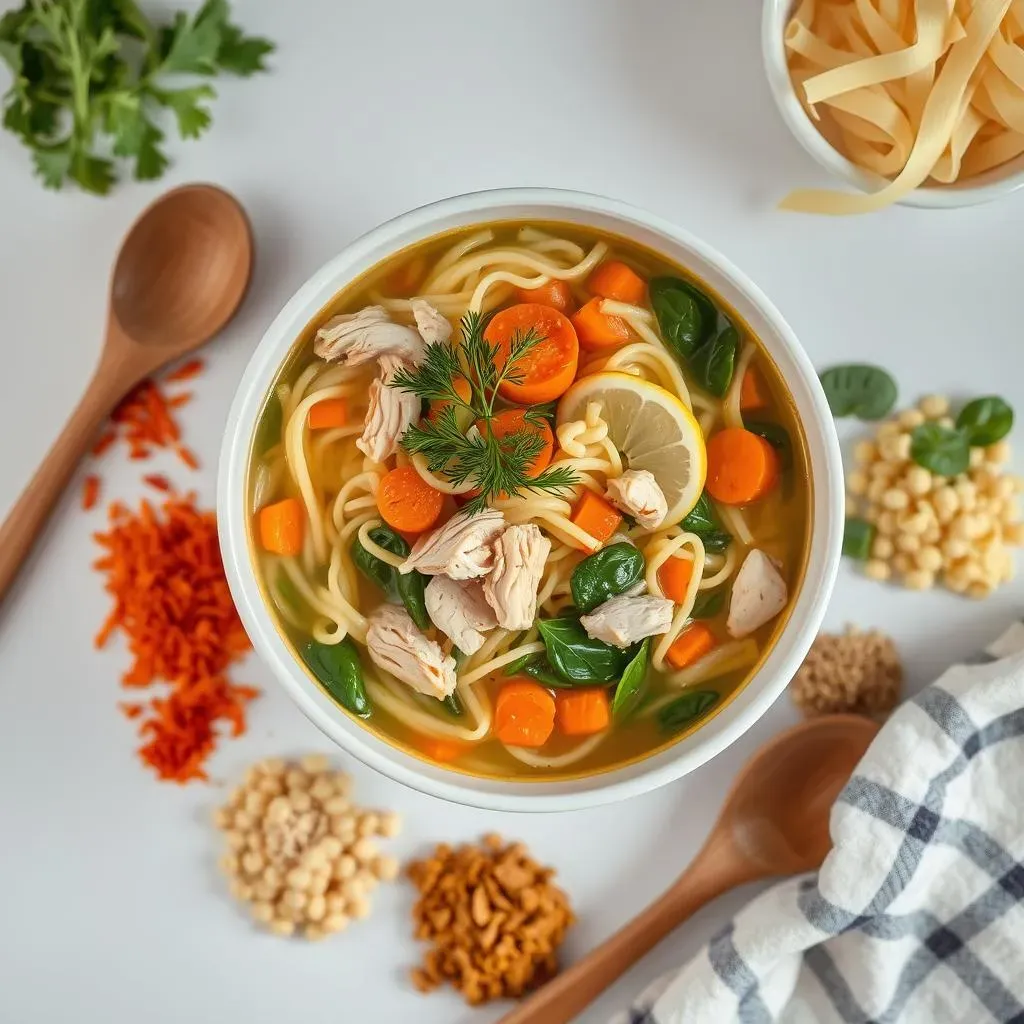
Variations and Addins for Your Chicken Noodle Soup Recipe
Spice It Up: Adding Heat and Flavor
Want to kick your chicken noodle soup up a notch? Don't be afraid to experiment with different spices and flavorings! A pinch of red pepper flakes can add a subtle warmth, while a dash of smoked paprika can provide a smoky depth. For a more exotic twist, try adding a bit of ginger or turmeric – both have anti-inflammatory properties and add a unique flavor dimension. You can also experiment with different herbs. Instead of dill and parsley, try adding cilantro, oregano, or even a bit of rosemary for a more savory flavor. Just remember to add spices and herbs gradually, tasting as you go, until you achieve the perfect balance.
Another trick I love is to add a squeeze of lemon juice at the end. It brightens up the flavors and adds a refreshing tang.
Beyond Noodles: Exploring Different Starches
While egg noodles are the traditional choice for Jewish chicken noodle soup, there's no reason to limit yourself! You can experiment with different types of noodles, such as wide rice noodles, ditalini pasta, or even gluten-free options like quinoa pasta or zucchini noodles. For a more substantial soup, try adding cooked rice, barley, or even small dumplings like kreplach or matzo balls. Matzo balls are my favorite. Each starch will add a unique texture and flavor to the soup, so have fun experimenting and finding your favorite combination.
Just remember to adjust the cooking time accordingly. Some starches will cook faster than others, so keep an eye on them and add them to the soup at the appropriate time.
Veggie Power: Boosting the Nutritional Value
Want to pack even more nutrients into your chicken noodle soup? Load it up with extra vegetables! In addition to the classic carrots, celery, and onions, try adding spinach, kale, zucchini, or even broccoli. Mushrooms can also add a savory depth of flavor. If you're feeling adventurous, try adding some sea vegetables like wakame or kombu for a boost of minerals and umami flavor. Just remember to chop the vegetables into small, bite-sized pieces so they cook evenly and are easy to eat.
Another great way to boost the nutritional value of your soup is to add beans or lentils. Chickpeas, kidney beans, or green lentils are all excellent choices, providing protein, fiber, and essential nutrients.
Add-in | Flavor Profile | Nutritional Benefits |
|---|---|---|
Red Pepper Flakes | Spicy | Boosts metabolism |
Ginger | Warm, slightly spicy | Anti-inflammatory |
Turmeric | Earthy, slightly bitter | Anti-inflammatory, antioxidant |
Spinach | Mild, slightly earthy | Rich in vitamins and minerals |
Mushrooms | Savory, umami | Rich in vitamins and minerals |
Chickpeas | Nutty, slightly earthy | High in protein and fiber |
Serving and Storing Your Homemade Jewish Chicken Noodle Soup
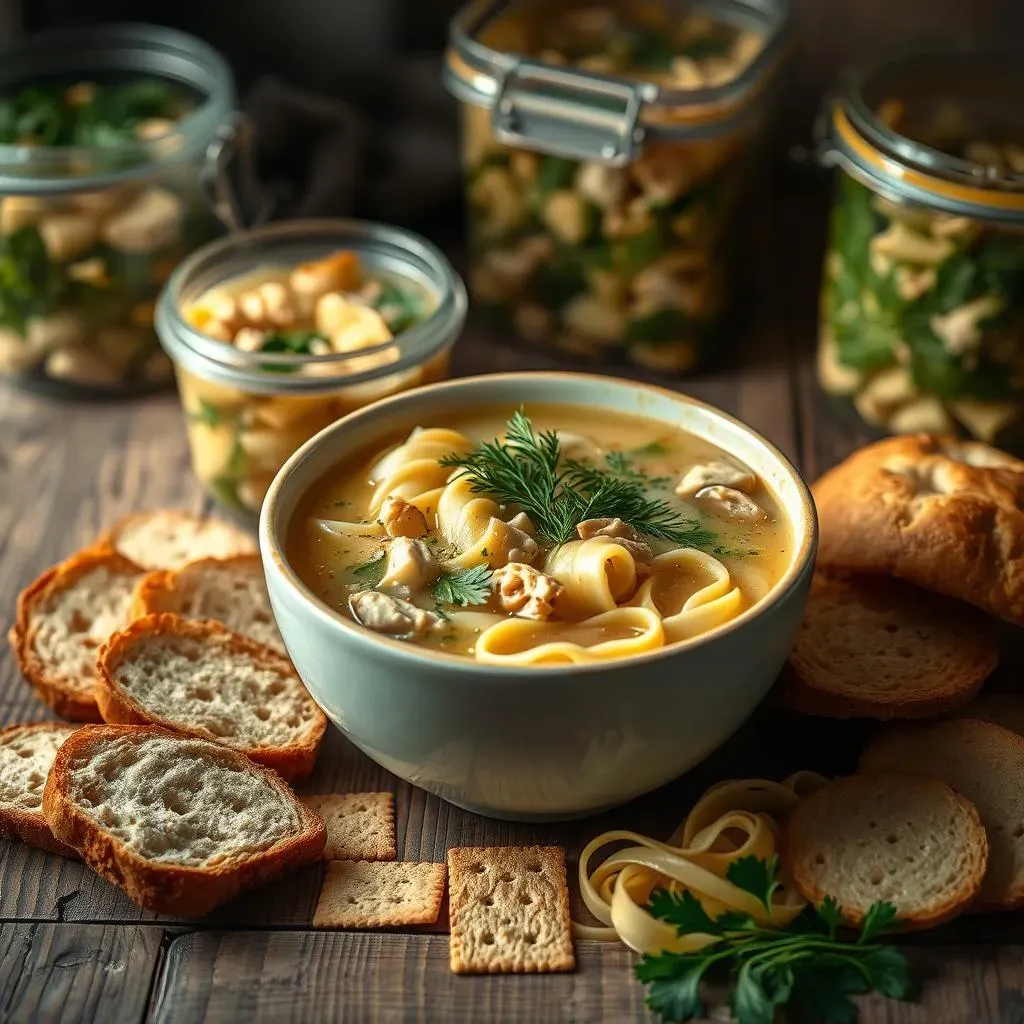
Serving and Storing Your Homemade Jewish Chicken Noodle Soup
Serving Suggestions: Warmth in Every Bowl
the soup's ready, and it smells divine! Serving is almost as important as the cooking itself. Ladle that golden goodness into bowls while it's piping hot. Garnish with a generous sprinkle of fresh dill or parsley – that pop of green just makes it look even more inviting. A side of crusty bread or matzo crackers is a must for dipping and soaking up every last drop. If you're feeling fancy, a lemon wedge on the side adds a bright, zesty kick that some people adore. But honestly, the most important ingredient is good company. This soup is meant to be shared with loved ones, creating warmth and connection around the table.
Think about presentation, too! A pretty bowl can make all the difference. I have these hand-painted ceramic bowls that I only use for special occasions, and they just elevate the whole experience. It's the little things, you know?
Storing Tips: Keeping the Comfort Alive
So, you've made a big batch, and there are leftovers? Fantastic! Jewish chicken noodle soup actually tastes even better the next day, after the flavors have had a chance to meld together even more. To store it properly, let the soup cool completely before transferring it to airtight containers. I usually portion it out into individual servings for easy lunches or quick dinners. Store it in the refrigerator for up to 3-4 days. If you want to keep it longer, you can freeze it for up to 2-3 months. When freezing, be aware that the noodles may become a bit softer upon thawing, but the flavor will still be amazing.
When reheating, gently warm the soup on the stovetop over medium heat, stirring occasionally, until heated through. Avoid boiling it, as this can make the noodles mushy. You can also reheat it in the microwave, but be sure to use a microwave-safe container and heat it in short intervals, stirring in between, to prevent it from splattering. And don't forget to add a fresh sprig of dill or parsley before serving – it'll brighten up the flavors and make it taste like it was just made.
Storage Method | Duration | Tips |
|---|---|---|
Refrigerator | 3-4 days | Cool completely before storing in airtight containers |
Freezer | 2-3 months | Noodles may become softer upon thawing |
The Enduring Comfort of Jewish Chicken Noodle Soup
From its humble origins as a simple broth to its revered status as "Jewish penicillin," chicken noodle soup holds a special place in the hearts and homes of many. This chicken noodle soup recipe jewish is more than just a collection of ingredients; it’s a symbol of warmth, healing, and tradition. Whether you follow our recipe to the letter or add your own family's secret touches, the most important ingredient is always love. So, gather your family, simmer a pot of this liquid gold, and savor the comforting flavors of a timeless classic. After all, a bowl of homemade Jewish chicken noodle soup is a hug in a bowl, perfect for any occasion.
